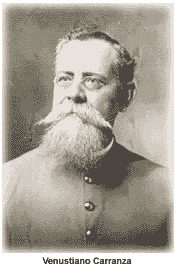The ABC Conference (May-June 1914)
The Vera Cruz incident threatened to boil over into a new Mexican War—a conflict desired by neither the United States nor Mexico. Argentina, Brazil and Chile saved the day by offering mediation. The ABC nations arranged a meeting in Niagara Falls, Canada in May 1914, drawing together representatives from the U.S. and Mexico.
 A plan was finalized in late June, which provided for the following:
A plan was finalized in late June, which provided for the following:
- General Huerta was to surrender the reins of his government to a new regime
- The United States would receive no indemnity for its losses in the recent chaotic events
Huerta retired from office in July and later left the country. His successor, Venustiano Carranza, rejected the agreement, not wanting to be associated with a power that was occupying his country.
The United States took no formal notice of the Mexican position, soon withdrew its forces from Vera Cruz, and extended diplomatic recognition to the Carranza regime.
A period of relative calm followed, but that was soon shattered by the actions of
Pancho Villa.
To other
Wilson foreign affairs activities.
 A plan was finalized in late June, which provided for the following:
A plan was finalized in late June, which provided for the following: